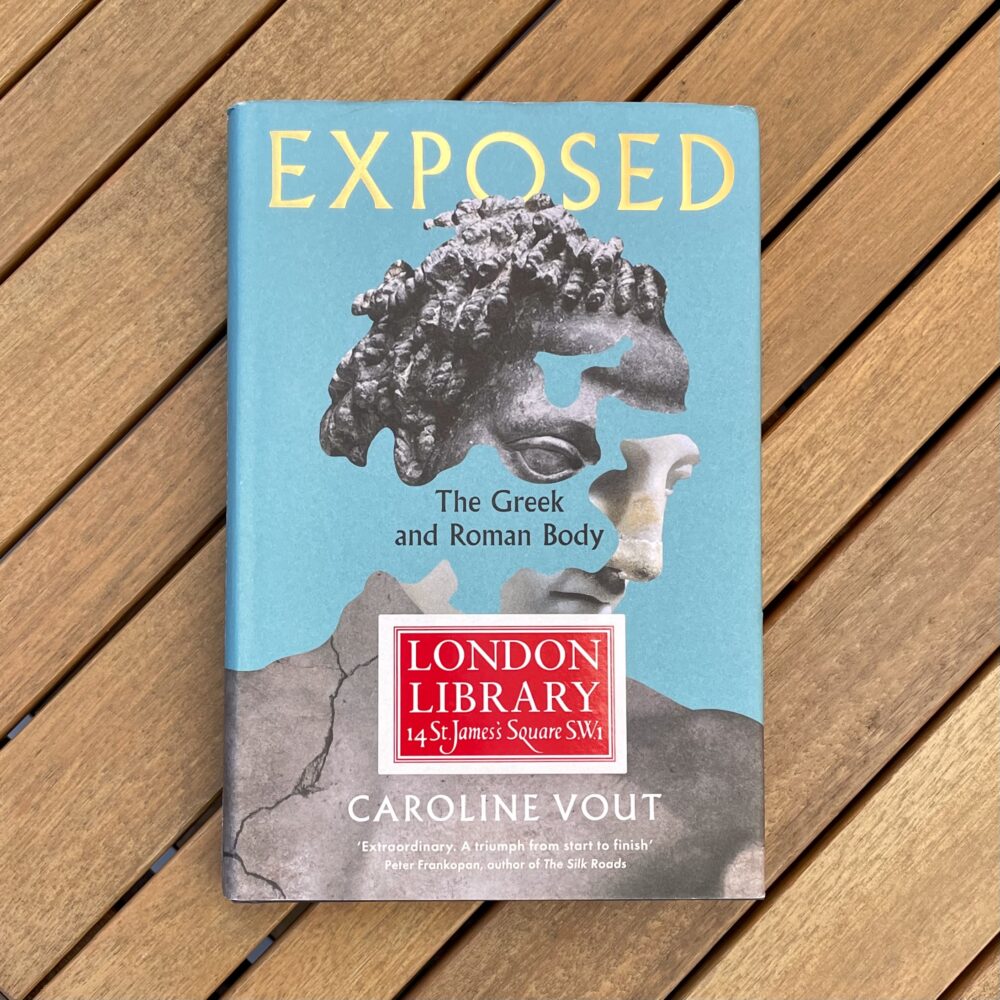I’ve been reading ‘Exposed’ by Caroline Vout

This 2022 book was drawn to my attention by a review in the TLS, yet somehow still managed to get the wrong end of the stick regarding what it was about. I had expected something fairly anatomical, but as Vout says in her epilogue:
This book is less a biography of the Greek and Roman body, its birth, growth, death, afterlife (though there is a bit of that) than a scenography in nine acts that puts the human body into a series of performative contexts, contexts fuelled by fantasy as much as by scabby reality. And not just the bodies of the wealthy, healthy men that dominate elite texts, but female bodies, disadvantaged bodies, dead bodies. It is what has made visual and material culture so vocal, and replaced a narrative arc with a perspectival view that gives these bodies space to breathe.
I found this book to be a slightly odd combination of content about mythological stuff, like the bodies of the Greek gods, and real-world stuff, like the treatment of Roman slaves. I wonder if this combination comes naturally to Vout as a classics professor, and is only confounding to someone with absolutely no knowledge in the field, like me.
This meant that there were some bits of this book which I found very dull. I really couldn’t give two hoots about the sexual relations of mythical gods. But there were also riveting bits which gave me entirely new insights into life in Roman times. There were more of the latter than the former, and they have transformed my understanding of some historical trends.
For example, I had no idea that the early Christian church was fairly ambivalent about marriage, and that Roman society saw this as a threat. I had no idea that religious involvement in funerals is a relatively modern development. And I had no idea that the debates raging today about gender identity have some interesting parallels in Roman times.
Here are some quotations which I noted down:
Having a baby was a public duty, and one for which the women of Sparta were especially primed. Rather than sitting inside and spinning wool like their Athenian counterparts they were mandated by law to take as much exercise as the men, participating in running races and physical training so as to increase the chances of giving birth to vigorous offspring. Spartan husbands were ordered to spend only limited time with them, the implication being that this would increase the longing of both parties, and again, the strength of the children. These women were not just born to breed; they were breeding machines, honed like well-fed thoroughbreds to produce the kind of stock that would best serve a competitive culture.
Giving oral sex was considered particularly demeaning to the man, demanding as it did that he debase himself for his partner’s gratification. But women who performed fellatio were also condemned; the charge of having an impure mouth was the ultimate insult, whatever one’s gender, and the preserve of the prostitute.
For Plato, drugs were a last resort. Diet and exercise were where it was at: ‘no diseases which do not involve great danger ought to be irritated by drugs’. I think back to the neuralgia I experienced a few years ago and to my GP prescribing an anti-depressant that had ‘a helpful side effect’. And I am grateful to the friend who told me to throw the tablets in the bin and book my first yoga class.
Ask Antony or Timarchus whether they were homosexual or heterosexual and they would have struggled to understand the question. But this does not mean that the ancients were blind to the sex or gender of their bedfellows. In a world in which women were widely regarded as inferior to men, sleeping with them had to be different. Sleeping with slaves had to be different too, whether male or female, however masculine or feminine. Timarchus’s prosecutor is keen to acknowledge that relations between citizen males could, and should, be intimate and affirming, as indeed they were between Greek heroes, Achilles and Patroclus, who also slept with women. This is not the same as advocating intimacy over and above sex: there was nothing wrong with homosexual sex as long as citizens did not demean themselves in the process. It is about creating a space for love, and a love between men that could be as erotic as it was educative, more erotic in some ways than with a wife or prostitute. Sex with women was functional: in the case of Neaira, the brothel worker made wife, the jury (all male, of course) was being reminded that we have hetaerai for pleasure, concubines for the daily service of our bodies, and wives for the production of legitimate offspring and to have a reliable guardian of our household property’. In Greek discourse, if not also in practice, sex with another male was seen as more cerebral.
Christianity threatened the state by threatening the institution of marriage that had played such a central role in the story of Rome’s foundation. This was very much the line that Augustine pedalled when, in 401 CE, he wrote tracts on marriage and on holy virginity. A couple did not even have to be married, as long as they were faithful, prepared to put up with each other until one of them died, and relaxed about getting pregnant. Contraceptive methods were to be discouraged, but abstinence from sex was permissible, as long as both partners were happy with that, and as long, of course, as they were not getting their kicks elsewhere.
This wasn’t the book I was expecting it to be, but I enjoyed much of it nonetheless. I’m grateful to the London Library for lending me a copy to read.
This post was filed under: Post-a-day 2023, What I've Been Reading, Caroline Vout.